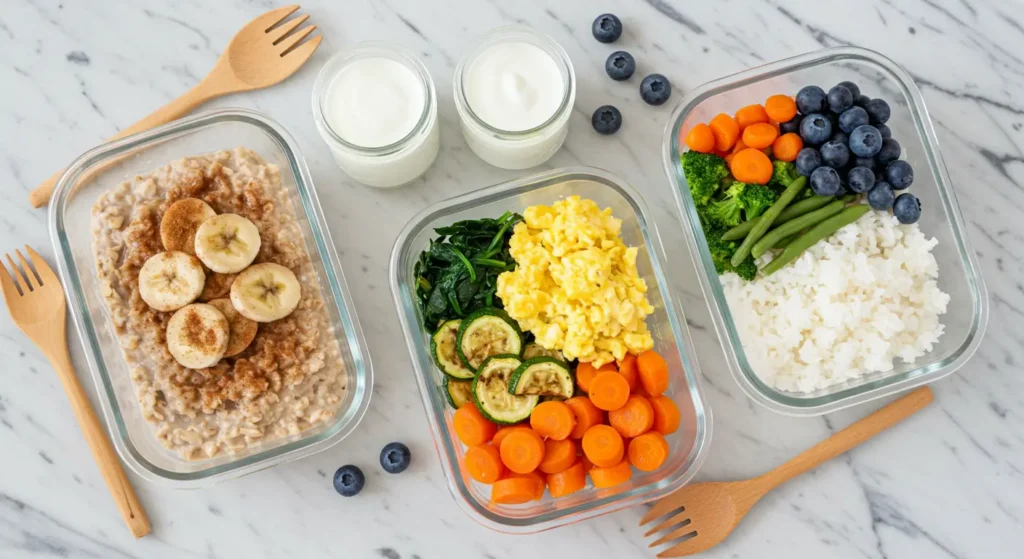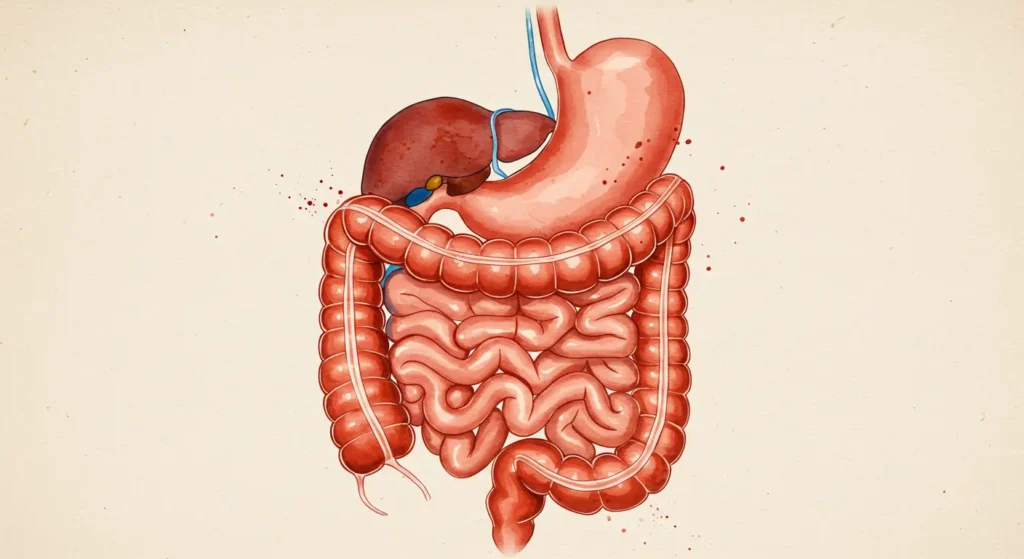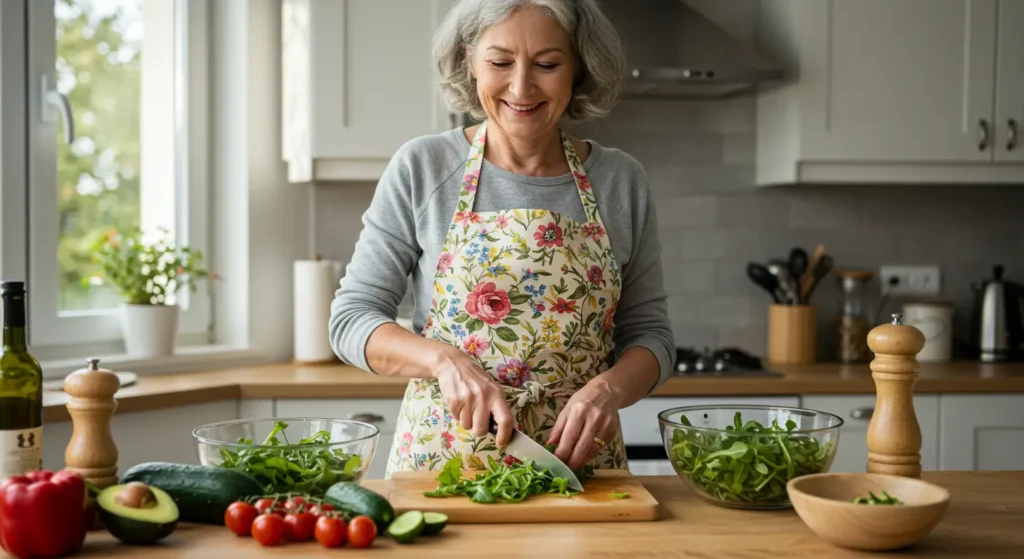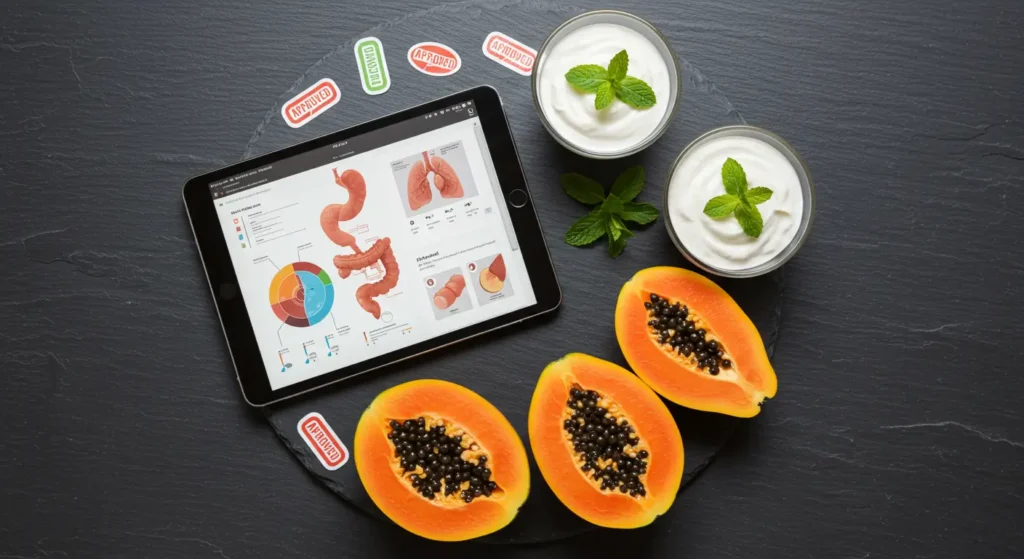
As we age, bloating becomes a surprisingly common issue — and not just after a heavy meal. For many adults over 60, even simple, healthy foods can suddenly lead to uncomfortable fullness, tightness, or gas. This isn’t just inconvenient — it can affect your energy, confidence, and even your sleep. Sometimes, bloating is also one of the early signs of poor gut health that shouldn’t be ignored.
But the answer isn’t cutting back on food. In fact, it’s about learning which foods support your digestion — and which ones quietly work against it. The encouraging part? A few thoughtful food swaps can ease your symptoms and help restore balance to your gut.
In this article, you’ll discover the best gentle foods to eat when you’re feeling bloated after 60 — and how these small changes can bring lasting relief.
Gentle Foods That Help With Bloating After 60

When your gut feels off, the first step is choosing foods that are easy to digest and naturally calming. These foods can soothe your digestive system, reduce gas, and minimize bloating — without sacrificing taste or nutrition.
Here are some of the most effective gentle foods to include:
- Cooked Vegetables – Lightly steamed or roasted carrots, zucchini, spinach, and green beans are much easier on the gut than raw veggies, which can be tough to break down.
- White Rice and Quinoa – These simple grains are easy to digest and rarely cause irritation. They’re great staples to pair with other bloat-friendly meals.
- Bananas and Blueberries – These fruits are rich in fiber and antioxidants, yet low in fermentable sugars that often cause bloating in sensitive individuals.
- Lactose-Free Yogurt or Kefir – Fermented dairy with live probiotics can help balance gut bacteria, especially when lactose is removed.
- Oats – A warm bowl of plain oatmeal can be incredibly soothing, offering soluble fiber that helps regulate digestion without triggering gas.
- Eggs – Soft-boiled or scrambled eggs are gentle, protein-rich, and unlikely to upset your stomach when cooked simply.
The key is to eat these foods in smaller, well-balanced meals and pay attention to how your body reacts. Often, bloating improves simply by giving your gut a break from harder-to-digest ingredients.
What to Avoid When You’re Feeling Bloated
Just as there are soothing foods, there are also common culprits that can trigger or worsen bloating — especially in people over 60 whose digestion may already be more sensitive. Avoiding or limiting these foods can make a noticeable difference in how your gut feels. And since bloating can even impact your rest, some older adults find that adding simple breathing techniques for sleep helps ease tension in both the gut and mind.
Here are a few to watch out for:
- Onions and Garlic – These are high in fermentable sugars (FODMAPs) that often lead to gas and bloating, even in small amounts.
- Beans and Lentils – Though nutritious, they contain fibers and sugars that ferment in the gut and can trigger discomfort for those with sensitive digestion.
- Cabbage, Broccoli, and Cauliflower – Cruciferous vegetables are known for causing gas and bloating due to their sulfur-containing compounds and fiber content.
- Dairy Products – Milk, cheese, and cream can be difficult to digest if you’re lactose intolerant, which becomes more common with age.
- Carbonated Drinks – Bubbles from soda and sparkling water can introduce extra gas into the digestive tract and lead to bloating.
- Artificial Sweeteners – Sorbitol, mannitol, and other sugar alcohols found in “sugar-free” products are poorly absorbed and often cause bloating and gas.
Keeping a food journal can help you spot patterns and identify which of these trigger symptoms most consistently for you.
How to Listen to Your Gut and Make Food Choices That Work
As we age, our bodies become more sensitive to the foods we eat — and our gut is often the first to signal when something’s off. Instead of ignoring those signals or constantly guessing what might be causing bloating, a smarter approach is to slow down and observe how your body reacts to certain meals or ingredients.
You don’t need a medical degree to do this. Start with a food journal — just a simple notebook or app where you track what you eat and how you feel after. Patterns will start to emerge. Maybe dairy makes your belly feel tight, or maybe certain fruits trigger gas. This kind of awareness is incredibly powerful.
Over time, these insights help you build a personalized eating plan — one that truly works for you, not against you. It’s not about restriction, but about clarity and confidence in your food choices — especially when you aim to improve gut health naturally as you age.
And if you’re looking for a guided way to identify triggers and build a gut-friendly plan, there are step-by-step resources made for people over 60 that focus on clarity, not complexity.
The Gentle Power of Cooked Vegetables and Soothing Ingredients
When your gut feels bloated or unsettled, raw salads or heavy meals can often make things worse — even if they seem “healthy.” That’s why cooked vegetables, especially when prepared gently, are a game-changer for people over 60.
Lightly steaming or roasting foods like carrots, zucchini, spinach, or pumpkin breaks down their fibers, making them easier to digest while still delivering nutrients. Cooked root vegetables like sweet potatoes or parsnips also provide steady energy without irritating the gut.
Alongside those, ingredients like ginger and fennel are known for their calming effects. A warm ginger tea after meals can help ease bloating and settle your stomach — a simple ritual that many older adults now swear by. Many people choose a calming ginger tea like this one to enjoy after meals and support digestion naturally.
Probiotics and Fermented Foods – Are They Right for You?

As we age, the balance of bacteria in our gut can shift — sometimes leading to more frequent bloating, irregular digestion, or food sensitivities. That’s where probiotics come into the picture. Found in foods like yogurt, kefir, and fermented vegetables, these “good bacteria” help support a healthier microbiome, especially when paired with a gentle diet. Some prefer getting started with a Probiotic Protein Shake Powder that’s easy on digestion and designed for adults over 60.
But it’s not just about adding any probiotic-rich food. The key is choosing strains and servings that work well for your specific symptoms. For example, some seniors find that certain yogurts are too harsh on their stomach, while others feel significant improvement after just a few days of incorporating them into breakfast or snacks.
Even small changes can make a difference — helping you reduce bloating and even boost energy naturally after 60 through better digestion.
When to Consider a Guided Plan

If you’ve been dealing with bloating for a long time and feel like you’ve “tried everything,” it might be time to take a more structured approach.
Some people benefit greatly from trial and error — but for many adults over 60, experimenting with random diets and internet tips can quickly become overwhelming. Without a clear direction, it’s easy to end up eliminating too many foods, missing key nutrients, or making things worse.
That’s where guided plans come in.
A well-designed digestive reset program can walk you step-by-step through the process of identifying trigger foods, building gentle meal plans, and restoring balance to your gut — without guessing or going hungry.
CONCLUSION – Gentle Choices, Big Results

Bloating after 60 isn’t something you have to “just live with.” Your body may simply be asking for a different kind of support — and the right foods can offer powerful relief when chosen with care.
Whether you start with one new food or overhaul your entire routine, remember: small, consistent changes create the biggest long-term results.
And if you’re ready for a gentle, proven approach that shows you exactly what to eat — and what to avoid — without guesswork…
🛑 Disclaimer
This article is for informational and educational purposes only. It does not constitute medical advice, diagnosis, or treatment. Always consult your doctor or a qualified healthcare provider before making any significant changes to your diet or starting a new health program, especially if you have existing medical conditions or are taking medication. Individual results may vary based on health history, adherence, and other factors.
